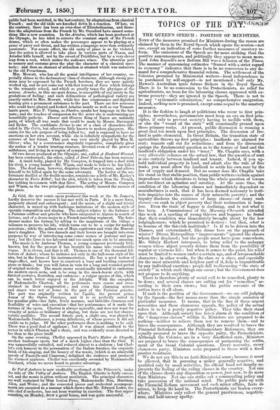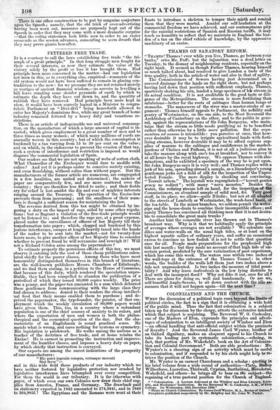TOPICS OF THE Dl i rc l `taw THE QTJEF;N'S SPEECH : POSITION OF
MINISTERS.
NONE of the measures promised for Ministers during the recess are claimed by them in the Royal Speech which opens the session—not one, except an indication of some further measures of sanatory re- form. The omissions of the Speech are far more striking than the positive announcements, and politically they appear to mean snore. Lord Sohn Russell's new Reform Bill was a delusion of the Times. The manner of announcing estimates "framed with a strict regard to economy " indicates that there is to be no concession to any de- mand for a comprehensive financial reform. The settlement of the Colonies promised by Ministerial writers—local independence to be purchased by self-support-4s not mentioned ; but only Mr. Hawes's Australian iglus fataus flickers in the Royal Speech. There is to be no concession to the Protectionists, no relief for agrieultmists, no boon for the labouring classes oppressed with ex- treme poverty—they are ignored in the Speech. There is not to be any "systematic colonization," no comprehensive emigration. Indeed, nothing new is promised, except some sequel to the sanatory measures.
It is the fashion to laugh at politicians who recur to fast prin- ciples; nevertheless, governments must keep an eye on first prin- ciples, if only to prevent society's having to meddle with them, or else the "vessel of the state" will occasionally ground upon those primary rocks. At present, public discussion is running a great deal too much upon tint principles. The discussion of
Ire- land is quite elemental. In Great Britain, the transition state of agriculture throws up first principles : landlords are alarmed for rent; tenants call out for reductions ; and from the discussion. springs the fundamental question as to the tenure of land and the landlord's obligation under his "trust." Mr. Chaplin says, with a very allowable reliance on the actual law, that the question of rent is one entirely between landlord and tenant. Indeed, if you up- hold individual property in land, and admit also the rule of free trade, you must allow the landlord to settle his own rent by the law of supply and demand. But no sooner does Mr. Chaplin take his stand on that stable position, than public writers exclaim against imprudence which threatens to bring the whole question of tenure into too direct an agitation and scrutiny. At the same time, the condition of the labouring classes not immediately dependent on manufactures is such, that it :has been deemed necessary to insti- tute inquiries into the causes of their miserable poverty ; and the inquiry discloses the existence of large classes—of many such classes—so sunk in abject poverty that their reclamation is hope- less. 'Even the trade of beggar is declining, and is not what it has been. A Commissioner of the Morning Chronicle attended this week at a meeting of young thieves and beggars : he found that their condition was immediately brought about by the low lodginghonses; which he promised to destroy : but then, what is to become of the thievish multitude Is it to be driven into the Themes, and exterminated, like drone bees on the approach of winter ? Divers Metropolitan " improvements" ignored the classes whom they displaced ; but the people must have gone somewhere. Mr. Sidney Herbert interposes, to bring relief to the unhappy women whose abject poverty debars them from the possibility of regular or virtuous life : but when it comes to the point, his relief must be limited to women under a certain age, and of irreproachable character; in other words, for the class as a class, and especiallyfor the most miserable and helpless part of it, help is impracticable by any individual exertion-: people fall to discussing "the state of society" in which such things can occur ; but the Government does not propose to do anything. There is therefore plenty of social evil to be remedied, plenty to be done ; and several classes are calling out for "remedies," ac- cording to their own views ; but the public servants of the nation leave it all alone.
If such is the position of the Government—we are still judging by the Speech—the fact means more than the simple omission of particular measures. It means, that in the face of these urgent necessities and these clamorous appeals, the policy of the actual rulers is to be a purely negative policy. They take their stand upon that. Although society has taken alarm at the condition of the "dangerous classes" within it, Ministers are prepared to do nothing—neither to relieve them nor to remove them— and to brave the consequences. Although they are resolved to brave the Financial Reformers and the Parliamentary Reformers, they are equally prepared to brave the opposite party, the Protectionists. Although the Colonies are in a very disaffected state, Ministers are prepared to brave the consequences of postponing the settlei, merit of the broad Colonial questions. Every necessity, every chunorous party, Ministers seem prepared to brave with a fixed passive resistance.
We do not say this in an Anti-Ministerial sense; because it must be allowed, that in pursuing a volley generally negative, and quelified only by small activities, the official band not inaptly re- presents the feeling of the ruling classes in the country. Not one of the classes shows any disposition or power, just now, to do more than Ministers. Not one can strike out a commanding policy and take possession of the national mind. The public puts up with the Financial Reform movement and such minor affairs, fante de mieux, to keep its hand in. The Protectionists are beaten every- where. Ministers only reflect the general passiveness, negative- ness, and half-uneasy apathy.
There is one other construction to be put by sanguine conjecture upon the Speech ; namely, that the old trick of over-advertising having been worn out, measures are purposely kept out of the Speech in order that they may come with a more dramatic surprise —that the ruling statesmen look little now in order to an easier crescendo as the session advances, consenting to seem dwarfs that they may prove giants hereafter.



























 Previous page
Previous page